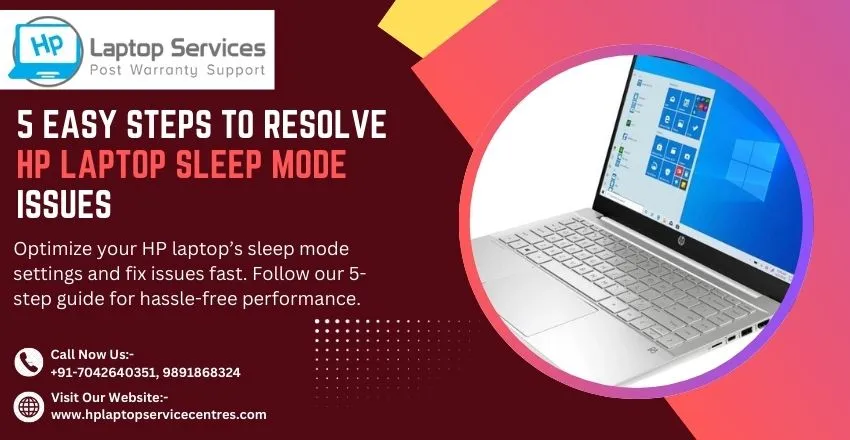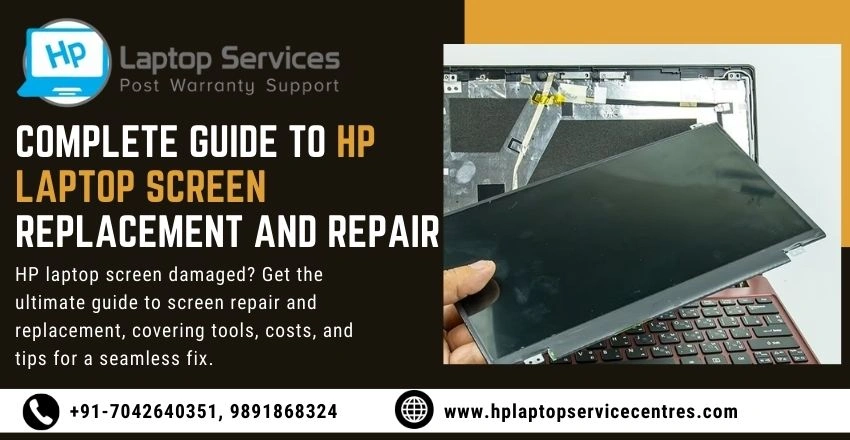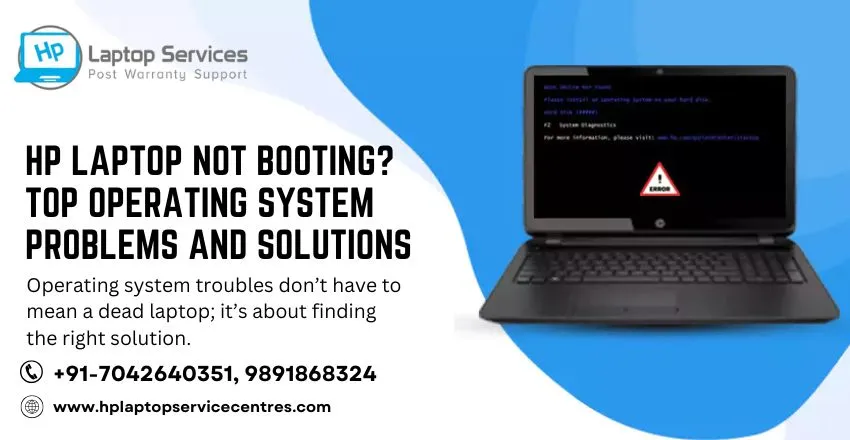Call Us: +91-7042640351, 9891868324
Top 5 Common Software Issues in HP Laptops and How to Fix Them
By Admin | 22 Oct 2024

Your HP laptop is a vital tool for productivity, entertainment, and communication. However, like any device, it’s not immune to software issues. Problems like slow performance, unexpected crashes, and connectivity errors can seriously disrupt your workflow and leave you frustrated. The good news is that most of these issues have straightforward fixes that you can implement at home. In this post, we’ll cover the top 5 common software problems in HP laptops and show you how to resolve them quickly and efficiently.
1. Slow Performance and Freezing
Issue:
One of the most common complaints from HP laptop users is sluggish performance or constant freezing, especially when multiple applications are running. This can be caused by insufficient memory, outdated drivers, or excessive background processes.
Solution:
- Free Up Disk Space: Delete unnecessary files and uninstall unused applications. You can also use disk cleanup tools to clear temporary files.
- Update Drivers: Visit HP’s official website to download and install the latest drivers for your laptop.
- Manage Startup Programs: Use Task Manager to disable unnecessary programs from starting up automatically, which can help speed up your system.
2. Operating System Crashes (BSOD)
Issue:
The infamous "Blue Screen of Death" (BSOD) is a major frustration for users. It typically occurs due to hardware or driver issues, corrupt system files, or incompatible software.
Solution:
- Check for Updates: Ensure your operating system and drivers are up-to-date, as outdated drivers often cause crashes.
- Scan for Malware: Malware can sometimes cause OS instability. Use a reputable antivirus program to scan and remove any threats.
- Run System Diagnostics: HP laptops come with built-in diagnostic tools. Use HP Hardware Diagnostics to check for hardware issues.
- Restore System to Previous Point: Use System Restore to roll back your laptop to a previous, stable state if the issue started after installing new software.
3. Software Compatibility Issues
Issue:
Sometimes HP laptop users encounter problems with certain software not running properly, either due to compatibility issues or outdated software.
Solution:
- Update the Software: Ensure the software is up to date. Developers often release patches to fix bugs and improve compatibility.
- Run in Compatibility Mode: Right-click on the program’s icon, go to Properties > Compatibility, and select a previous version of Windows that the software was known to work with.
- Reinstall the Software: If compatibility remains an issue, uninstall the software and reinstall it using the latest version.
4. Wi-Fi Connectivity Problems
Issue:
HP laptop users often report connectivity issues with Wi-Fi, such as intermittent connection, no connection, or low speed. This can be due to network driver issues, outdated Wi-Fi adapters, or router problems.
Solution:
- Restart the Router and Laptop: Begin by restarting both your router and laptop to reset network connections.
- Update Network Drivers: Outdated network drivers are a common cause of Wi-Fi problems. Visit HP’s website to download the latest drivers for your laptop’s Wi-Fi adapter.
- Check Network Settings: Go to Network and Sharing Center and troubleshoot network settings to ensure the correct configurations are applied.
- Forget and Reconnect to Network: Forget your Wi-Fi network and reconnect to it, ensuring you enter the correct credentials.
5. Frequent Application Crashes
Issue:
Some HP laptop users experience frequent application crashes, where programs stop responding or close unexpectedly. This is often caused by corrupted files, memory issues, or software conflicts.
Solution:
- Update the Application: Ensure the application is running the latest version. Updates often fix bugs and improve stability.
- Run System File Checker: Use the built-in System File Checker tool (SFC) to scan and repair corrupt system files that may be affecting application stability.
- Check for Conflicting Programs: Some programs may conflict with each other. If you notice crashes after installing a new app, uninstall it to see if the issue persists.
- Increase Virtual Memory: In cases where your laptop runs out of physical memory (RAM), increasing the virtual memory allocation can help. Go to System Properties > Advanced > Performance Settings > Advanced and adjust the virtual memory settings.
Conclusion
Software issues can be frustrating, but most common problems on HP laptops can be fixed with a few troubleshooting steps. By regularly updating your system, keeping software drivers current, and running routine maintenance, you can prevent many of these problems from occurring. If you're still facing software issues, visiting a professional repair center can help ensure your HP laptop continues to perform at its best.
Need Help? Visit Our HP Laptop Service Center
If you're facing any of these software issues and need professional assistance, our certified technicians are here to help! Visit our HP Laptop Service Center for fast and reliable repairs, or call us today to schedule a service.
Our Support Cities :- Delhi | Noida | Gurgaon | Ghaziabad | Faridabad | Greator Noida | Mumbai | Pune | Kolkata | Ahmedabad
Looking For A Fast & Reliable Laptop Repair Service
We have professional technicians, fast turnaround times and affordable rates. Book Your Repair Job Today!















